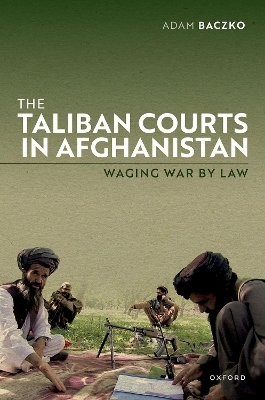
The Taliban Courts in Afghanistan
Oxford University Press (Verlag)
9780198896777 (ISBN)
How did the Taliban gain the trust of the Afghan population through decades of conflict? How did they put themselves in a position to regulate social relations? And with what consequences for Afghan society? The Taliban Courts in Afghanistan: Waging War by Law explores how the Taliban used the law as a resource in its conflict with militarily and technologically superior Western armies. While the international coalition set up an inadequate and corrupt legal system, the Taliban set up hundreds of courts in the countryside. By insisting on due process, impartiality of judges, and the enforcement of verdicts, this system of justice established itself as one of the few sources of predictability in the daily lives of Afghans.
The armed movement used law to substantiate their claim to embody the state, disseminate their vision of society, and establish local legitimacy. Their courts attempted to balance the political agenda of the movement, the demands of Islamic law, the needs of the population, and the expectations of international legal actors whose implicit recognition they desired. In contemporary civil wars, where dispensing justice is at once a juridical activity, a political weapon, and a stake in the war, this book thus accounts for why the West lost the war and how the Taliban took over the country.
Based on the author's extensive fieldwork in various provinces in Afghanistan and unique access to Taliban judges and court users, this socio-legal investigation offers new perspectives on a country that was at war for over four decades. Baczko proposes an innovative reflection on the place of law and courts in civil wars as well as a stark reminder of the dangers of foreign intervention. Timely and thought-provoking, this book is appeals to a multi-disciplinary audience including legal scholars, political scientists, sociologists, diplomats, policy-makers, and anyone interested in the Afghan conflict.
Adam Baczko is CNRS Research Associate Professor at the Centre for International Studies of Sciences Po. He holds a PhD from the EHESS and conducts field-based research on the formation of legal institutions by armed movements and international actors in contexts of armed conflict, with a particular focus on Afghanistan, Syria and Mali. With Gilles Dorronsoro and Arthur Quesnay, he is the co-author of Civil War in Syria: Mobilisation and Competing Social Orders (Cambridge University Press, 2018).
Introduction: A sociological approach to law in civil wars
Part I: Legal Uncertainty
1: A revolution in the juridical field
2: The social upheavals of a war-torn society
3: Regime justice: Rubberstamping the balance of power
4: The US Army: Reinventing the tribe, circumventing the courts
Part II: The Taliban Courts
5: A bureaucratic system
6: The dual membership of judges
7: The trials
Part III: Producing a Social Order Through the Law
8: Judges as an instrument of centralization
9: Legitimation through law
10: The society project
Conclusion: The internationalization of law in civil war
| Erscheinungsdatum | 21.11.2023 |
|---|---|
| Verlagsort | Oxford |
| Sprache | englisch |
| Maße | 160 x 241 mm |
| Gewicht | 604 g |
| Themenwelt | Recht / Steuern ► EU / Internationales Recht |
| Recht / Steuern ► Strafrecht ► Besonderes Strafrecht | |
| Sozialwissenschaften ► Politik / Verwaltung | |
| ISBN-13 | 9780198896777 / 9780198896777 |
| Zustand | Neuware |
| Informationen gemäß Produktsicherheitsverordnung (GPSR) | |
| Haben Sie eine Frage zum Produkt? |
aus dem Bereich


![Lernen mit Fällen : materielles Recht & Klausurenlehre ; [Musterlösungen im Gutachtenstil] - Strafrecht Besonderer Teil 1 - Winfried Schwabe](/media/122164275)